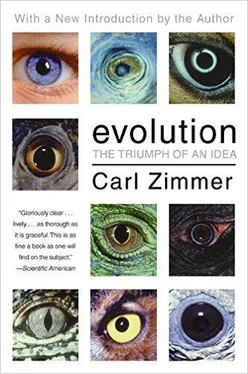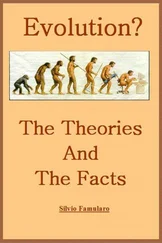Carl Zimmer - Evolution - The Triumph of an Idea
Здесь есть возможность читать онлайн «Carl Zimmer - Evolution - The Triumph of an Idea» весь текст электронной книги совершенно бесплатно (целиком полную версию без сокращений). В некоторых случаях можно слушать аудио, скачать через торрент в формате fb2 и присутствует краткое содержание. Год выпуска: 2006, ISBN: 2006, Издательство: Harper Perennial, Жанр: Биология, на английском языке. Описание произведения, (предисловие) а так же отзывы посетителей доступны на портале библиотеки ЛибКат.
- Название:Evolution: The Triumph of an Idea
- Автор:
- Издательство:Harper Perennial
- Жанр:
- Год:2006
- ISBN:978-0-06-203823-4
- Рейтинг книги:4 / 5. Голосов: 1
-
Избранное:Добавить в избранное
- Отзывы:
-
Ваша оценка:
- 80
- 1
- 2
- 3
- 4
- 5
Evolution: The Triumph of an Idea: краткое содержание, описание и аннотация
Предлагаем к чтению аннотацию, описание, краткое содержание или предисловие (зависит от того, что написал сам автор книги «Evolution: The Triumph of an Idea»). Если вы не нашли необходимую информацию о книге — напишите в комментариях, мы постараемся отыскать её.
Evolution: The Triumph of an Idea — читать онлайн бесплатно полную книгу (весь текст) целиком
Ниже представлен текст книги, разбитый по страницам. Система сохранения места последней прочитанной страницы, позволяет с удобством читать онлайн бесплатно книгу «Evolution: The Triumph of an Idea», без необходимости каждый раз заново искать на чём Вы остановились. Поставьте закладку, и сможете в любой момент перейти на страницу, на которой закончили чтение.
Интервал:
Закладка:
Intelligent design, on the other hand, comes nowhere close. You will search long and hard through scientific journals to find a paper documenting a new and important discovery about how nature works made possible by intelligent design. In 2004, the Discovery Institute triumphantly announced that one of its fellows, Stephen Meyer, had published the first paper in a peer-reviewed journal about intelligent design. In a review that appeared in the Proceedings of the Biological Society of Washington, Meyer argued that the Cambrian Explosion (a period when many major groups of animals first appeared) could not have been the result of evolution. But this glory was short-lived. The council of the Biological Society of Washington issued a statement that the former editor who had handled Meyer’s paper had violated the journal’s rules for peer review. They stated that “there is no credible scientific evidence supporting I.D. as a testable hypothesis to explain the origin of organic diversity. Accordingly, the Meyer paper does not meet the scientific standards of the Proceedings.”
As I explained earlier, human origins is one of the most exciting areas of research in evolution. To understand why scientists find intelligent design so useless, just compare what it has to say about human origins. Of Pandas and People explains that “design adherents” consider hominids “as little more than apes, and point instead to the abrupt appearance of the culture and patterns of behavior which distinguish man from the apes.” It does not explain what is intelligent about an intelligent designer that created at least twenty lineages of human-like apes, all of which became extinct. It does not explain why the older lineages are more like apes, with smaller brains and longer arms. It does not explain why younger lineages gradually acquired more traits in common with humans, such as taller bodies, bigger brains, and increasingly sophisticated tools. It does not add anything to our understanding of the vast genetic similarities of chimpanzees and humans, or explain how the differences arose. It does not offer any hypothesis about when Homo sapiens first emerged, or where, or how.
To be fair, the passage in the previous paragraph comes from the most recent edition of Of Pandas and People, which came out in 1993. With all of the findings that have emerged since then, have intelligent design adherents found something more concrete to say about human origins? Hardly. In a 2004 essay on the subject, William Dembski, a mathematician and theologian at Southern Baptist Theological Seminary, kept up the tradition of haziness. “There may be good reasons for thinking that humans are redesigned monkeys,” he wrote. “Even so, a design-theoretic perspective does not require that novel designs must invariably result from modifying existing designs. Hence, there may also be good reasons for thinking that a redesign process didn’t produce humans and that, instead, humans were built [sic] from the ground up. Design theorists have yet to reach a consensus on these matters.”
There’s a big difference between being designed from scratch or redesigned from monkeys. One wonders how long we’ll have to wait for them to settle on one or the other.
The contrast between intelligent design and evolutionary biology could not be more clear when it comes to human origins. While intelligent design advocates have wandered in this haze, evolutionary biologists have done more than find new fossils and evidence from DNA linking us to other apes. Since 2001 they’ve made astonishing progress toward understanding the genetic changes that helped to make us uniquely human.
This advance was made possible by some new statistical methods for detecting the fingerprint of natural selection. One common kind of mutation changes a single nucleotide—a “letter” in the genetic code. This sort of mutation can have one of two effects. Some mutations change the way a cell translates the code of a gene into a protein. Other mutations don’t. Scientists call these mutations non-silent and silent substitutions, respectively.
Non-silent substitutions give rise to new sorts of proteins. Those proteins may be so deformed that they cause devastating diseases. Or they may turn out to help an individual survive. Natural selection may favor beneficial non-silent substitutions, and they may spread until they are carried by every individual in a species. Silent substitutions, on the other hand, have no effect on the structure of proteins. Natural selection cannot drive them into extinction or help them spread. Their fate is a matter of pure chance.
One way to detect natural selection’s fingerprint is to tally up the silent and non-silent substitutions in a human gene. When a gene undergoes strong natural selection, it builds up a number of mutations that change the shape of the protein they make. These non-silent mutations make up a much higher proportion of the differences in the gene, compared to silent ones.
Since 2001, methods like this one have allowed scientists to discover thousands of genes that underwent strong natural selection over the past six million years of hominid evolution. Scientists can even measure the strength of natural selection that has acted on these genes. You might think that the genes at the top of the list would be involved in the things that seem to set us apart most obviously from other animals, such as our oversized brains or our upright posture. But that’s not the case. Instead, sex and disease have had the most intense effects on our DNA.
As I explain in chapters 9 and 10 of Evolution: The Triumph of An Idea, these two factors are huge evolutionary forces throughout the natural world. So it should not be a big surprise that we humans obey the rule. Viruses, bacteria, and other pathogens have been adapting to our bodies for millions of years. The evolution of new defenses against diseases literally meant the difference between life and death for our ancestors. And as soon as our ancestors evolved new defenses, their parasites were evolving new ways to evade them. Locked in this perpetual arms race, disease-related genes have been drastically altered over the past six million years of hominid evolution.
Intense natural selection has also been at work on human genes involved in building eggs and sperm. Studies on animals have revealed how sexual selection can turn into an arms race. Male fruit flies, for example, appear to inject chemicals when they mate that make females less receptive to other males. The females in turn evolve ways to neutralize the chemicals, which spurs the males to evolve even more powerful compounds. Such an unconscious battle between the sexes may have been the cause of some of the intense selection acting on human genes.
Sperm may also be competing with one another. A gene that allows sperm to grow rapidly and ignore the signals that would ordinarily make them stop dividing will produce more sperm carrying that gene. Scientists suspect that it’s no coincidence that some of these fast-evolving genes also become active in cancer cells. What’s good for a fast-dividing sperm cell may also be good for a fast-dividing tumor.
More subtle—but no less important—has been natural selection’s effects on the human brain. Six million years ago, the brains of our ancestors were a third the size of our own. They probably had a mind like other apes. They communicated in grunts and gestures. They could not use fire or make sophisticated stone tools. They could not get a deep understanding of what other individuals were thinking or feeling. In 2001, scientists had yet to identify the fingerprint of natural selection on a single gene active in the human brain. As I write this, they’ve found hundreds.
It is going to take a very long time to assemble these new pieces of research together into a clear understanding of how the human brain diverged from other ape brains. Scientists just don’t know much yet about how genes build brains. But clues are already emerging. Some of the most tantalizing clues come from a gene called ASPM. It first came to the attention of scientists because of the devastating effects that occur when the gene mutates. Children with mutant forms of the gene generally grow very small—or microcephalic—brains. The outer layer of the brain, called the cerebral cortex, is almost entirely missing from microcephalic brains. Clearly, ASPM plays some sort of crucial role in growing brains. And it turns out to have undergone strong natural selection since our ancestors split from other apes. It’s possible that ASPM is part of the answer to how our brains got so big. The evolution of ASPM may have been particularly crucial to the expansion of the cerebral cortex, in which we carry out our most abstract thoughts.
Читать дальшеИнтервал:
Закладка:
Похожие книги на «Evolution: The Triumph of an Idea»
Представляем Вашему вниманию похожие книги на «Evolution: The Triumph of an Idea» списком для выбора. Мы отобрали схожую по названию и смыслу литературу в надежде предоставить читателям больше вариантов отыскать новые, интересные, ещё непрочитанные произведения.
Обсуждение, отзывы о книге «Evolution: The Triumph of an Idea» и просто собственные мнения читателей. Оставьте ваши комментарии, напишите, что Вы думаете о произведении, его смысле или главных героях. Укажите что конкретно понравилось, а что нет, и почему Вы так считаете.












